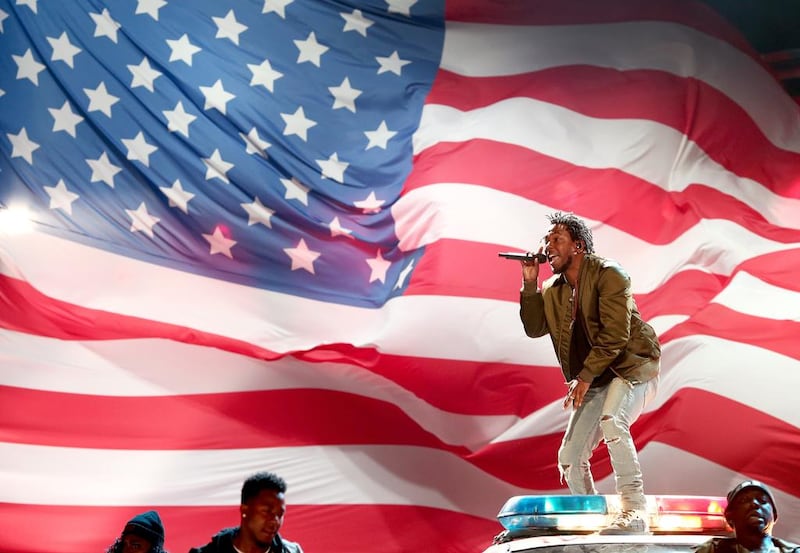Last Wednesday, the youth-focused US news website Mic.com posted a video to Facebook that quickly clocked up more than 10 million views.
Titled 23 Ways You Could Be Killed If You Are Black in America, the film features singers Alicia Keys, Beyoncé, Bono, Pharrell Williams, Rihanna and many others. No one sings or performs in the stark, black-and-white video. Instead, the stars flatly state the circumstances and reasons, many of them shockingly innocuous, surrounding the shootings of African-Americans by law-enforcement officers in the United States.
“Walking home with a friend,” says R&B singer Janelle Monáe, before we see a photo of Greg Gunn, who was killed in February in Montgomery, Alabama.
“Calling for help after an accident,” says rapper ASAP Rocky.
“Walking away from police,” says Common.
“Walking toward police,” says Queen Latifah.
The timing of the release of the video was no accident – July 13 marked the third anniversary of the acquittal of George Zimmerman, the neighbourhood-watch coordinator who shot and killed 17-year-old high-school student Trayvon Martin – another casualty the video pays tribute to – at a gated community in Sanford, Florida.
Zimmerman’s acquittal was also a factor in the coining of the #BlackLivesMatter (BLM) hashtag on social media, and the subsequent, increasingly high-profile activist movement of the same name, which was founded by black community workers Alicia Garza, Patrisse Cullors and Opal Tometi in the summer of 2013.
BLM has raised public awareness through staged “die-ins” – at which participants lie prostrate in public spaces – and hundreds of protests and marches across the US.
The role of popular musicians and other celebrities in the promotion of BLM has become more prominent of late.
Kendrick Lamar's Alright, the 2015 song he described as a "chant of hope", has become the key anthem of the movement. Protesters can be heard singing its quirky and hooky chorus ("Do you hear me, do you feel me? We gon' be all right") en masse at demonstrations.
As well as the evocative lyrics and Lamar’s electrifying performance, the track’s power derives from producer Pharrell Williams’s rich and extraordinarily inventive arrangements. The accompanying video was a further talking point: Lamar raps on top of a trashed police car covered in graffiti.
‘Silence is our enemy’
Monáe aligned herself with BLM fairly early on. She took part in one of the movement's marches in Philadelphia in August last year, and led fellow artists from her Wondaland Records label on the protest single Hell You Talmbout that same month.
A decidedly Afrocentric call-and-response affair, the song, available on the Wondaland Records SoundCloud account, shouts the names of black victims of shootings by police officers.
“We recorded it to challenge the indifference, disregard and negligence of all who remain quiet about this issue,” Monáe wrote in an Instagram post.
“Silence is our enemy. Sound is our weapon.”
Beyoncé weighs in
Much more visible, though, is Beyoncé's latest album Lemonade, which was launched on Tidal, the streaming service she co-owns with her rapper husband Jay Z and other stars.
Released in April, Lemonade clearly joins the dots between the black civil-rights movements of the past and present. This is Bey channelling the sentiments, though not the sounds, of James Brown's 1968 single Say It Loud – I'm Black And I'm Proud, and Billie Holiday's haunting 1939 evocation of southern state lynchings, Strange Fruit. Lemonade's accompanying promotional film, which was screened on HBO, features moving footage of the mothers of Mike Brown (shot dead at the age of 18 by police in Ferguson, Missouri, in 2014) and Trayvon Martin. Both women are seen weeping while holding the last photos taken of their sons.
The film has been nominated for four Emmy awards, including Outstanding Variety Special and Outstanding Picture Editing. The imagery it contains, which hammers home the stark realities of injustice and loss, is difficult to see as anything other than powerful and necessary.
Beyoncé laid the groundwork for Lemonade in February, with her show-stopping performance of the album track Formation as part of the Super Bowl half-time show. With its state-of-the-art sonics and booming sub-bass, the song is a powerful ode to black womanhood, and recalls stereotypes. "I like my baby hair, with baby hair and afros / I like my negro nose with Jackson 5 nostrils."
International response
The Black Lives Matter movement has also inspired artists outside of the US. Last week, British hip-hop duo Rizzle Kicks posted on Facebook a music video for the punchy, incisive SLBK, in response to Black Lives Matter marches in London, Berlin and Amsterdam last week.
Galvanised by the BLM protests across the Atlantic, the young rappers, from Brighton, used SLBK to comment on the poverty and gang violence affecting black youths in the United Kingdom.
Music-streaming website 8.tracks.com currently offers 20 Black Lives Matter playlists.
Songs such as D'Angelo's Prince-like gem The Charade ("All we wanted was a chance to talk / 'Stead we got outlined in chalk"); J Cole's ballad Be Free; and Lauryn Hill's Black Rage (an audacious reworking of The Sound of Music's My Favourite Things), have also been adopted as anthems by BLM followers.
But to paraphrase a 1964 civil-rights anthem by soul great Sam Cooke, one senses that, if “a change is gonna come”, it needs to be soon, and peaceful. This is a point underlined by events in Baton Rouge, Louisiana, on Sunday, where gunman Gavin Long shot dead three police officers before being shot and killed himself.
artslife@thenational.ae










